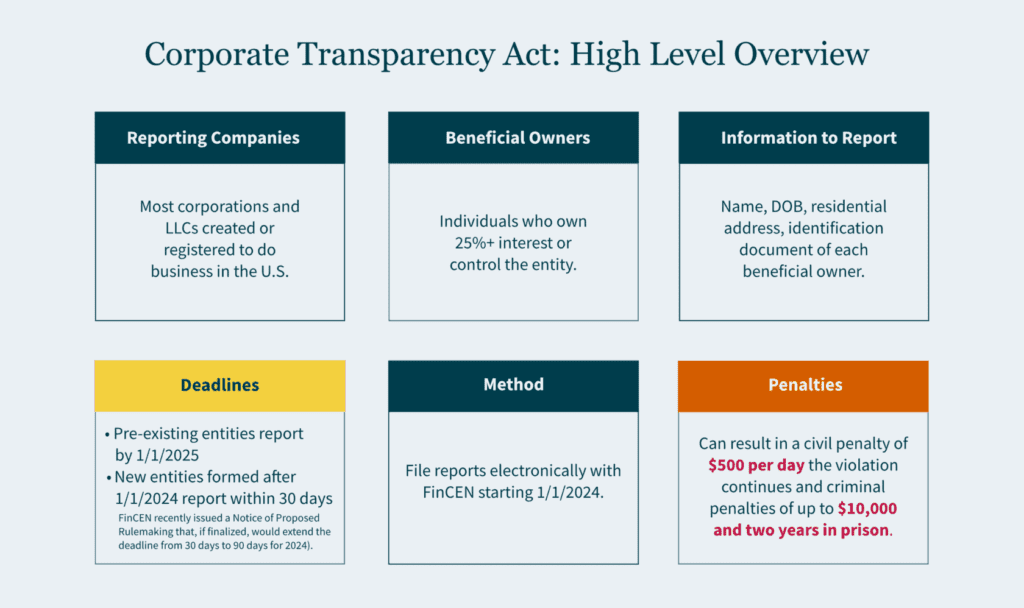The Corporate Transparency Act is going into effect on January 1, 2024, and it aims to combat illicit activity relating to U.S. businesses.
We’ve got some important news to share that might have slipped under the radar for many, but it directly impacts you, especially if you own real estate through an LLC or another entity.
The Corporate Transparency Act that went into effect on January 1, 2024 (CTA), a recent law that’s quietly come into play. Wondering what it’s all about and how it affects you as a real estate investor? Let me break it down for you.
Decoding the Corporate Transparency Act (CTA):
In 2021, Congress rolled out the CTA with a specific goal in mind—to tackle shady dealings like money laundering and terrorist financing. One of its key aims is to thwart “criminal actors” from using entities to snag real estate. The challenge? Many states don’t require business owners to provide personal information, making it tricky for the government to stay in the loop. The CTA steps in to bridge that gap.
As of January 1, 2024, the CTA mandates real estate investors, who hold title to rental properties through an entity, to report three crucial pieces of information to the Financial Crimes Enforcement Network (FinCEN) of the U.S. Department of the Treasury.
The Essentials You Need to Know:
- Reporting Company Information:
- Reporting companies, whether homegrown or international, need to share the following details with FinCEN:
- Company name and any trade names or DBAs (if applicable)
- Business street address
- Formation jurisdiction
- Unique business number (think EIN number from the IRS)
Quick Heads Up: Certain reporting company types get a pass—like tax-exempt entities, inactive entities, and large operating companies.
- Beneficial Ownership Information:
- If you own more than 25% of a company holding your rental property title, congrats, you’re a beneficial owner! Those who exercise “substantial control” also fall under this category. Here’s what you need to share:
- Your name
- Your birthdate
- Your address
- A unique identifying number from your passport or driver’s license
- Company Applicant Information:
- For those forming entities after January 1, 2024 (that’s you, forward-thinking investors), you’ll need to provide:
- Your name (as the company applicant)
- Your birthdate
- Your business or residential address
- Details from your driver’s license or passport
When to Get Your Ducks in a Row:
- Existing companies (created/registered before January 1, 2024) must file BOI reports by January 1, 2025
- New companies (created/registered after January 1, 2024) must file within 30 days* of registration.
What If You Don’t Comply? Non-compliance with the CTA can result in a civil penalty of $500 per day the violation continues and criminal penalties of up to $10,000 and two years in prison. Correcting omissions or errors within 90 days of the deadline may enable companies to avoid penalties.

Our Take on CTA:
Not everyone’s happy about the CTA, but it’s a game-changer for most real estate investors. Here’s the kicker—some services might not cover all the bases, exposing you to unnecessary risks.

